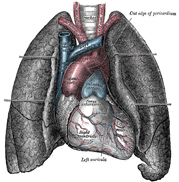 People with chronic lung conditions such as asthma or COPD are at risk of serious complications if they catch the flu. That’s why they are high priority for flu vaccination this winter – and every winter.
People with chronic lung conditions such as asthma or COPD are at risk of serious complications if they catch the flu. That’s why they are high priority for flu vaccination this winter – and every winter.
In an interview with Vaccines Today, a leading lung disease expert says it is well known that influenza can exacerbate persistent lung conditions, increasing the risk of hospitalisation.
‘The more severe the respiratory disease is, the higher the risk of hospitalisation if influenza occurs,’ says Dr Tobias Welte, Director of the Department of Respiratory Medicine, at the Hannover Medical School, Germany, and Chief Editor of the ERS Monograph.
 Dr Welte, a member of the editorial board for the European Respiratory Journal, said flu can even increase the risk of death for patients with pre-existing respiratory disease.
Dr Welte, a member of the editorial board for the European Respiratory Journal, said flu can even increase the risk of death for patients with pre-existing respiratory disease.
‘Everybody suffering from a chronic disease should be vaccinated against influenza,’ he says.
However, Dr Welte says that many patients – and even some doctors – do not realise how series the risks are. Patients may not even know that they are in a priority group for the annual flu vaccine.
Consult your doctor to find out whether you are in a priority group for flu vaccination.
Read the European Lung Foundation advice on vaccination and lung disease
Below is the full text of our interview with Dr Tobias Welte, Director of the Department of Respiratory Medicine, Medizinische Hochschule Hannover and Chief Editor of the ERS Monograph.
Vaccines Today: Should people with chronic lung diseases have the flu vaccine?
Dr Tobias Welte: Yes, everybody suffering from a chronic disease should be vaccinated against influenza. It is well known that influenza worsens a chronic disease and increases morbidity and mortality from chronic diseases.
Vaccines Today: So, the risks of flu-related complications more serious for people with chronic lung diseases?
Dr Tobias Welte: Absolutely. For example, exacerbation of asthma and COPD could be caused by influenza, worsening of interstitial lung disease is related to influenza, and similarly every pulmonary disease could be influenced by the infectious agent [influenza virus].
Vaccines Today: Is there a higher risk of hospitalisation from flu?
Dr Tobias Welte: The more severe the respiratory disease is, the higher the risk of hospitalisation if influenza occurs.
Vaccines Today: Are there other vaccines that chronic lung patients should also consider?
Dr Tobias Welte: The most important is pneumococcal vaccination. Pneumococcal pneumonia and invasive pneumococcal disease due to pneumonia is more likely in patients with chronic lung diseases. The “old” 23 valent polysaccharide vaccine has been shown to reduce the number of invasive pneumococcal disease, the “newer” 13 valent conjugated vaccine has recently been shown to reduce the risk for pneumonia and for invasive pneumococcal disease.
In addition, Whooping cough in adults could be a problem as it is more severe than in childhood. Childhood vaccination normally prevents until the third decade of life. As the immunological response is the best around the 20th year of age, a booster vaccination against whooping cough should be performed at this time.
Vaccines Today: Why, in your opinion, do too few people with lung diseases have recommended vaccines?
Dr Tobias Welte: There are several problems: First, patients are not informed about the risk of infectious disease and their impact on the course of their pulmonary disease. Patient-focused educational programmes – media campaigns – seem to be necessary to get better awareness among patients themselves.
Secondly, reimbursement policy. If vaccines are reimbursed by the health care system, vaccination rates are higher. Vaccination saves money due to a reduction in morbidity in total and especially a reduction of hospitalisation, of vaccination seems to be cost effective in anyway.
Third, physicians do not know exactly what the influence of infection on pulmonary diseases is. Educational programs for physicians to inform patients about the importance of vaccination are necessary.
Vaccines Today: Can doctors do more to encourage their respiratory patients to have vaccines such as the flu vaccine?
Dr Tobias Welte: Yes doctors can and have to. However, as I mentioned, they need to be better educated about vaccination.




